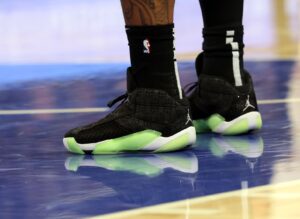On April 15th, 2019, DeMarcus Cousins suffered a season-ending left quad tear. An injury that, according to ESPN’s Marc Spears, took Charlotte Hornets guard Tony Parker eight months to recover from, this unfortunate event will have a definite impact on the next contract that Cousins signs this offseason. After most recently signing a minuscule one year contract for five million dollars last year, we wonder: will the four-time NBA all-star sign another small bridge contract or will he find a team willing to give him a long-term deal?
DeMarcus Cousins’ Contract Outlook for 2019-20 NBA Season
The Case for a Long Term, Big Money Deal
There really does not seem to be much of a case for Cousins receiving a long term deal. However, this may depend on the specific teams vying for his services. Given the fact that he suffered his injury recently, a Parker-like recovery time (eight months) puts him back on an NBA court around mid-December or early January of 2020.
For many teams, especially contenders, this likely places him back in the lineup slightly too late for him to be able to prove himself as a viable long term option in following seasons. Simply put, questions about his health are mounting with every new injury. Therefore, it is increasingly hard to tell if he will ever be healthy enough to achieve the same quantifiable production he has reached in years past.
A more desperate NBA franchise, however, might be a different story. In other words, a
“non-contender” might bring Cousins aboard with a substantial deal, depending on the motives of both parties.
Maybe they want to sell more tickets this coming season.
Perhaps they know he is not healthy now but the team is willing to bank on his future health.
Maybe Cousins himself wants to opt for security and comfort rather than placing himself in a short-term situation mired with instability.
Whatever the reason, several NBA teams may be willing to give DeMarcus Cousins a lucrative deal this offseason. This is especially true if the team is a non-contender looking for future prosperity.
This is unlikely, but who can tell?
In a league where stars are almost always expected to sign in big markets like New York, and Los Angeles but have occasionally proven to forego that opportunity for other “smaller” markets, anything is possible.
The Case for a Short Term, Small Money Contract
Conversely, Cousins may sign another one or two-year bridge contract this offseason. An important caveat, however, again, is that this depends on the motives of the team and Cousins alike.
Does an established playoff contender need a piece just to get them over the “hump”?
Does Cousins want a one-year deal to prove his worth (and health) before signing a larger contract?
In this case, a smaller and cheaper contract would make the most sense for both sides. The team signing him gets a star player capable of making a real impact later in the season. Meanwhile, Cousins gets to patiently recover and play basketball next season without locking himself into a disadvantageous long-term contract — as he may, from a competitive standpoint, if he signs with a “non-contender”.
The Golden State Warriors, for instance, could potentially bring Cousins back for another season.
Ultimately, from a general perspective, there seems to be more logic in a deal of this type. Again, however, this is wholly dependent on the particular intentions of both Cousins and any interested teams.
Conclusion
It seems more likely than not that Cousins sign a short-term deal offered by a “contender” this offseason.
Cousins’ decision to join Golden State prior to this season is an important one. This seemed to indicate his desire to play for a contender rather than take the most money available, although some outlets reported that he received very few offers on the open market.
If that trend continues, Cousins is likely to sign another “bridge” deal this offseason, although likely not with the Warriors. The Warriors simply have more pertinent, and more expensive, free agents to look after prior to considering Cousins.
Instead, a short-term deal with the seemingly “forever contenders” in San Antonio (~ $8.9 million in cap space) seems significantly more viable. Likewise, the LeBron James-led Los Angeles Lakers may take a run at Cousins this July. Los Angeles has just under $42 million in cap room to work with, making a Cousins deal financially feasible.
Still, it is also technically possible that a team like the New York Knicks and Cousins agree to a long-term, big money contract. With approximately $72 million available, the potential exists that DeMarcus signs a deal prioritizing financial and personal stability.
Again though, given DeMarcus Cousins seemingly potent desire to play for a championship, a deal with a contender seems more likely. Given many contenders’ existing payrolls and Cousins’ health-related uncertainty, though, this next deal will likely be short in term and relatively inexpensive.
Ultimately, there are still three months until the start of the NBA’s 2019-20 free agency period. Only time will tell what type of deal Cousins signs with his next opportunity, but most signs point to another short-term, small money contract with a contender.
Main Photo:






